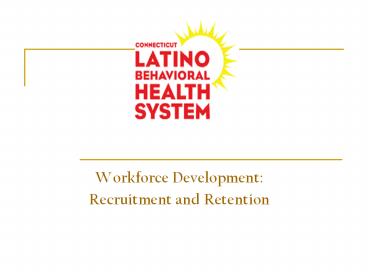Workforce Development: - PowerPoint PPT Presentation
1 / 14
Title:
Workforce Development:
Description:
Title: The CT Latino Behavioral Health System (CT LBHS): Creating a Culturally and Linguistically Competent Workforce Author: Michelle Silva Last modified by – PowerPoint PPT presentation
Number of Views:94
Avg rating:3.0/5.0
Title: Workforce Development:
1
- Workforce Development
- Recruitment and Retention
2
Todays Agenda
3
A Brief Summary
- About the CT LBHS
- Recruitment and Retention
- Evaluation Process
- Future Directions
4
I. Mission Statement
- The Connecticut Latino Behavioral Health System
(CT LBHS) represents a united effort to expand,
enhance, and evaluate a network of treatment
services through unique workforce development
initiatives created from regional partnerships
and tailored to meet the specific behavioral
health needs of the adult Latino community.
5
II. Recruitment
- Where we started
- Fall of 2005 Developing the initial proposal
- Winter 2006 Advocating at the state legislature
- July 2007 Awarded the first two years of funding
- How we recruited
- Consensus among hiring agencies for initial job
announcement - Local and national search
- Professional list-serves internet-based
employment sites - 32 APA-accredited pre- and post-doctoral training
sites - 38 regional colleges and universities
- 12 state and national professional organizations
(i.e., NLPA, - LSWO, NASW, CPA)
6
Contd
- Who contacted us
- 39 bilingual professionals with varied
credentials and training experiences (i.e., LPC,
BSW, LCSW, PhD, PsyD, APRN, CASAC, MD) - What we screened for
- credentials, experience with Latina/o
populations, overall fit based on agency need - Results
- 10 full-time, 2 part-time clinical positions,
effort of psychiatry time - 3 MSWs, 1 LCSW, 2 Masters-level substance abuse
counselors, 3 Predoctoral fellows, 3 Postdoctoral
Fellows - Relevant training experiences ranged from
international work at UN refugee operations to
years of living and working in local New Haven
area with Latina/o community
7
Retention Efforts
- Ensuring competitive salaries
- National median salary for social workers in
outpatient mental health and substance abuse
centers 34,290 (U.S. Dept. of Labor,
Occupational Outlook Handbook, 2008-09 Edition) - CT LBHS median salary 57,000
- Hosting monthly meetings with clinicians
(familismo) - Appointing new clinical faculty to provide
supervision to incoming students
- Providing the CT LBHS Training Academy (focus
groups on-site competency based CEUs) - Supporting additional professional training
opportunities (conferences) - Renewing annual license fees
- Serving as qualified site for the NIH HRSA Loan
Repayment Programs - Clinical supervision and mentorship
8
III. Evaluation Levels
- Level I Organizational
- Level II Staff
- Level III Client
- Overall Evaluation of Implementation Process
9
Organizational Level
- Cultural Competency Index (CCI) completed every
four months by staff and leadership - Sampling of items
- Management strategy
- Community and consumer involvement
- Supervision
- Direct service support
- Linguistically sensitive staff, documents, and
materials - Collection of accurate demographics
- Evaluation of ongoing cultural competence
- Structures and procedures
10
- Staff Level
- Pre- and post-training/consultation evaluation
- CT LBHS clinician evaluation
- Implementation of treatment (clinician checklist
random tape rating) - Latino cultural constructs
- Therapeutic alliance
- Clinician satisfaction
- Client Level
- Set of instruments to assess treatment outcome at
baseline, four months after baseline, and eight
months after baseline - Instruments assess
- Mental health and substance use disorders (BSI,
LDQ, TLFB)) - Readiness to change (URICA)
- Coping strategies (Brief COPE)
- Ethnic experience (SEE)
- Latino cultural constructs
- Therapeutic alliance (TCS)
- Quality of life
- Client satisfaction
11
Evaluation of the Implementation Process
- Focus groups and individual interviews
- Consumers
- LBHS leadership
- Agency leadership
- LBHS clinicians
12
In Summary, our Key Ingredients
- FINDING A COMMITTED, DEDICATED, SKILLED
WORKFORCE - TIMING
- CONFIANZA, PERSONALISMO, RESPETO
- CONSENSUS
- POSITIVE COMMUNITY RELATIONSHIPS
- ADVOCACY LEGISLATIVE SUPPORT
- SHARED RESOURCES
- INTELLECTUAL
- PHYSICAL
- HISTORY OF OUR TRAINING PROGRAM
- MENTORSHIP (support system)
13
IV. Future Directions
- Implementing a consultation model for agency
supervisors - Ongoing assessment of job satisfaction
- Addressing issues of sustainability and seeking
new funding sources - Expanding the training program
- Developing practicum placements w/tracks based on
professional interests (undergraduate and
graduate level) - Disseminating information (www.ctlbhs.org, La
Visión, Community Defined Evidence Project)
14
- GRACIAS!
- manuel.paris_at_yale.edu
- michelle.silva_at_yale.edu
- luis.aneznava_at_yale.edu
- luis.bedregal_at_yale.edu































